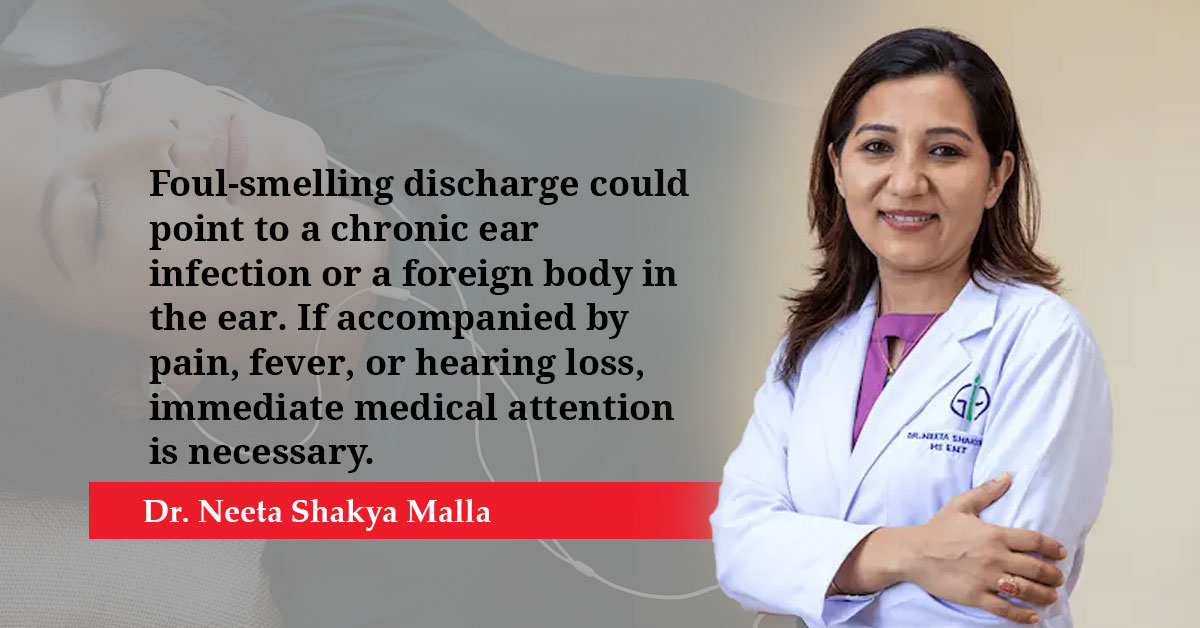

KATHMANDU: Ear health is essential for overall wellness. The ear is not just for hearing but also maintains balance.
Exposure to loud noise, poor ear hygiene, and infections can lead to hearing loss. Cleaning ears regularly and preventing exposure to loud sounds can help avoid harm.
If left untreated, ear issues can lead to dizziness, pain, and irreversible hearing loss. Regular check-ups ensure that any problems are detected early. If you experience pain, ringing, or hearing loss, consult a doctor immediately.
NepalNews had the privilege of speaking with Dr. Neeta Shakya Malla, Consultant ENT, Head, and Neck Surgeon in Nepal.
Dr. Malla is a highly experienced Otolaryngologist (ENT Specialist) dedicated to diagnosing and treating conditions related to the ear, nose, and throat.
With over a decade of experience in the field, Dr. Malla has successfully treated thousands of patients suffering from hearing loss, sinus infections, throat disorders, and other ENT-related issues.
She currently practices at Grande International Hospital, specializing in endoscopic sinus surgery, hearing restoration, and voice disorders.
What are the most common ear problems seen in patients?
Ear infections, earwax buildup, tinnitus (ringing in the ears), hearing loss, vertigo (dizziness due to inner ear problems), and Eustachian tube dysfunction are the most common ear problems patients experience.
Pain in the ear due to infection, allergies, or sinusitis is a common issue for many. Exposure to loud noise and aging can also lead to hearing loss. Some of these conditions can lead to complications if left untreated.
Why does ear pain happen?
Ear pain can be caused by a variety of factors. Otitis media, an infection or inflammation of the middle ear, typically caused by bacteria or viruses, is a common cause. Blockage of the ear canal by earwax, leading to pain, is another frequent reason.
Pain can also be caused by injury or trauma to the ear. Diseases such as sinus infections, throat infections, or temporomandibular joint (TMJ) dysfunction may refer pain to the ear. If pain persists, consult an ENT doctor for proper diagnosis and treatment.
What is otitis media? Why does otitis media occur?
Otitis media is an infection or inflammation of the middle ear, commonly seen in children but also affecting adults.
It occurs when the Eustachian tube, which connects the middle ear to the back of the throat, becomes blocked due to factors like the common cold, allergies, sinus infections, or respiratory infections.
When the tube is blocked, fluid builds up in the middle ear, creating a favorable environment for bacteria or viruses to grow, leading to infection.
What are the harmful effects of earbuds or earphones on the ear?
Using earbuds or earphones for extended periods can harm your ears. Listening at high volumes can damage ear cells, leading to hearing loss. Earbuds also increase the risk of ear infections, as they trap moisture and bacteria.
Prolonged use can cause ear pain, tinnitus (ringing in the ears), and dizziness. It also impacts brain function due to constant exposure to sound waves.
Noise-induced stress can disturb sleep and concentration. To prevent damage, keep the volume low and clean earbuds regularly.
What is the most common cause of ear discharge?
Fluid leaking from the ears can be caused by several factors. The most common causes are ear infections, such as otitis media or otitis externa, which lead to inflammation and fluid buildup.
Allergies, sinus infections, and colds can also cause fluid discharge. In some cases, fluid leakage can result from a ruptured eardrum or ear injury.
Excessive earwax buildup or foreign objects in the ear canal can also result in leakage.
Which type of ear discharge is considered dangerous?
Ear discharge could indicate a deep-seated infection or a severe condition. Thick, yellow, green, or bloody discharge may suggest an infection, such as otitis media or a perforated eardrum.
Foul-smelling discharge could point to a chronic ear infection or a foreign body in the ear. If accompanied by pain, fever, or hearing loss, immediate medical attention is necessary. Delaying treatment may lead to hearing loss or the spread of infection.
Is putting oil in the ear good or bad?
In Nepal, it is a common practice to put oil in the ears, especially for children. While oil can help soften earwax or provide relief from mild discomfort, it’s important to be cautious.
Oil should not be used if there is any ear infection or a perforated eardrum. Always use warm, sterile oil in small amounts, and avoid overuse.
If you experience pain, discomfort, or drainage from the ear, it is best to consult an ENT doctor to prevent further complications.
What can be done to prevent ear problems?
To prevent ear problems:
Clean your ears regularly, but avoid using cotton swabs or sharp objects inside the ear canal.
Protect your ears from loud sounds by using earplugs or lowering the volume when using earphones.
Dry your ears thoroughly after bathing or swimming to prevent infections.
Never insert dirty fingers or objects into your ear.
If you have allergies or a cold, take care to prevent ear infections.
Practice good hygiene and schedule regular check-ups with an ENT doctor.